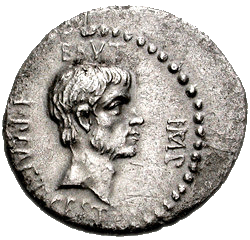Plot summary
In the aftermath of Gaius Julius Caesar's assassination, Posca attends to his master's corpse while Mark Antony staggers out of the Senate House, struggling to come to terms with what has happened. However, he is soon forced to run for his life when Quintus Pompey and a number of thugs attack and try to murder him. Antony flees and takes refuge at the Julii villa. Brutus, meanwhile, staggers back to his family home, traumatised by what he has done. Servilia consoles him, assuring her son he has done the right thing, but Brutus is too haunted by Caesar's death to take comfort from Servilia's assurances he has both redeemed their family name and saved the Republic.
At his home, Vorenus grieves over the body of Niobe; when his children appear, Vorenus turns on them in his grief and rage, knowing that they hid the knowledge of his wife's affair and secret child from him. In his fury, Vorenus curses his family and then storms out into the back alleys of Rome; his loss, combined with his discovery that Caesar is dead (an act he could have prevented) cause Vorenus to collapse where he stands, overwhelmed.
At the home of the Julii, Antony angrily threatens retribution on all Caesar's killers, as well as Vorenus for abandoning them; Atia reminds him that Servilia is the driving force behind the murders, and informs him that Vorenus was lured away. Antony advises Atia and her family to flee Rome with him to the north, where he can assemble an army to fall upon the Liberatores; however, they are stopped as they try to convince Caesar's widow, Calpurnia, who insists they must attend to Caesar's will. In it, Caesar has left a substantial sum of money to every citizen of Rome, frees Posca, and leaves his estate and title to Octavian, whom Caesar refers to as his son in the will. Knowing that he will get nothing if Brutus and his allies declare Caesar's death tyrannicide (which would make all of his acts null and void), Octavian convinces Antony and Atia to cut a deal with the assassins, since if Brutus and his allies do so, they also lose all the positions and power Caesar bestowed on them.
The next day, Antony heads to Servilia's villa to put the proposal to Brutus and Cassius, arriving as Cicero is in the middle of a speech praising them for their act. The group settles into a meeting, with Cicero acting as arbitrator (though Antony orders Quintus to leave, informing the others of Pompey's attempt to murder him; while Brutus denies involvement, Cassius remains silent). Antony comments that Caesar was beloved by the people, and they will hate his murderers for what they have done. He also reminds the group of what Octavian told him: that if they declare Caesar a tyrant, they lose all the power and influence he gave them. Antony proposes a solution: an amnesty in which Caesar is not declared a tyrant, nor are the Liberatores declared murderers, all his acts and his will stand, a funeral is held for Caesar, and then everything carries on as normal. After Antony leaves to give the others time to think over his offer, Brutus angrily remonstrates with Cassius for trying to kill Antony against his wishes. While Cicero, Cassius and Servilia urge him to kill Antony, Brutus refuses and agrees to the proposal. Antony departs, though not before killing Quintus as revenge for his attempted murder.
However, at Caesar's funeral, Antony uses his eulogy as an opportunity to incite the people against the assassins. Antony advises Brutus, Cassius and the others to leave Rome (which was his intention all along), but Servilia will stay (as a hostage to ensure their co-operation). However, when they refuse, and Cassius arrogantly sneers that the Senate and the 'men of quality' are with them, Antony's temper finally gets the better of him and he angrily bellows at Cassius "And I have an angry mob, that will roast and eat your men of quality in the ashes of the Senate House!". Cowed by Antony's fury, Brutus and Cassius, along with their allies, reluctantly depart Rome.
Still on their excursion to the countryside, Pullo asks his former slave, Eirene to marry him; though clearly surprised, she accepts. But when they hear the news of Caesar's death they immediately return to Rome. They search for Vorenus, only to find him in a terrible state and his children missing. Pullo consoles a distraught Vorenus that since he didn't seal the curse, he can easily lift it when the children return. However, after several days, and Niobe's funeral, the children still have not returned. After some investigation, they discover that their old enemy, Erastes Fulmen has taken the children. Vorenus and Pullo storm into a bathhouse, slaughter the men guarding him and interrogate Fulmen. Realising he is dead whether he speaks or not, Fulmen tells Vorenus that he took the children as payment for Vorenus's many "slights" against him, raped and killed them, then dumped the bodies into the Tiber. Furious, Vorenus beheads Fulmen and with Pullo, walks calmly out of the bathhouse, carrying Fulmen's head with him.


